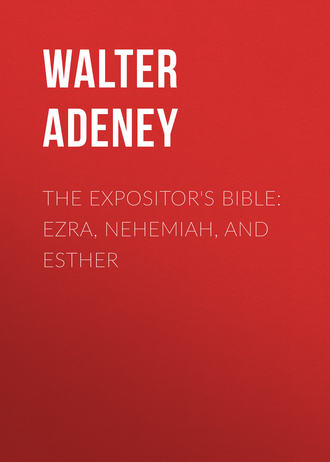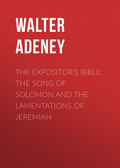
Adeney Walter Frederic
The Expositor's Bible: Ezra, Nehemiah, and Esther
But another consequence of the pageant was that the heart of Haman was turned to gall. We see him livid with jealousy, inconsolable until his wife – who evidently knows him well – proposes to satisfy his spite by another piece of fanciful extravagance. Mordecai shall be impaled on a mighty stake, so high that all the world shall see the ghastly spectacle. This may give some comfort to the wounded vanity of the grand vizier. But consolation to Haman will be death and torment to Mordecai.
Now we come to the second course of events that issued in the deliverance and triumph of Israel, and therewith in the escape and exaltation of Mordecai. Here the watchful porter is at the spring of all that happens. His fasting, and the earnest counsels he lays upon Esther, bear witness to the intensity of his nature. Again the characteristic reserve of the narrative obscures all religious considerations. But, as we have seen already, Mordecai is persuaded that deliverance will come to Israel from some quarter, and he suggests that Esther has been raised to her high position for the purpose of saving her people. We cannot but feel that these hints veil a very solid faith in the providence of God with regard to the Jews. On the surface of them they show faith in the destiny of Israel. Mordecai not only loves his nation; he believes in it. He is sure it has a future. It has survived the most awful disasters in the past. It seems to possess a charmed life. It must emerge safely from the present crisis. But Mordecai is not a fatalist whose creed paralyses his energies. He is most distressed and anxious at the prospect of the great danger that threatens his people. He is most persistent in pressing for the execution of measures of deliverance. Still in all this he is buoyed up by a strange faith in his nation's destiny. This is the faith that the English novelist has transferred to her modern Mordecai. It cannot be gainsayed that there is much in the marvellous history of the unique people, whose vitality and energy astonish us even to-day, to justify the sanguine expectation of prophetic souls that Israel has yet a great destiny to fulfil in future ages.
The ugly side of Jewish patriotism is also apparent in Mordecai, and it must not be ignored. The indiscriminate massacre of the "enemies" of the Jews is a savage act of retaliation that far exceeds the necessity of self-defence, and Mordecai must bear the chief blame of this crime. But then the considerations in extenuation of its guilt which have already come under our notice may be applied to him.267 The danger was supreme. The Jews were in a minority. The king was cruel, fickle, senseless. It was a desperate case. We cannot be surprised that the remedy was desperate also. There was no moderation on either side, but then "sweet reasonableness" is the last thing to be looked for in any of the characters of the Book of Esther. Here everything is extravagant. The course of events is too grotesque to be gravely weighed in the scales that are used in the judgment of average men under average circumstances.
The Book of Esther closes with an account of the establishment of the Feast of Purim and the exaltation of Mordecai to the vacant place of Haman. The Israelite porter becomes grand vizier of Persia! This is the crowning proof of the triumph of the Jews consequent on their deliverance. The whole process of events that issues so gloriously is commemorated in the annual Feast of Purim. It is true that doubts have been thrown on the historical connection between that festival and the story of Esther. It has been said that the word "Purim" may represent the portions assigned by lot, but not the lottery itself; that so trivial an accident as the method followed by Haman in selecting a day for his massacre of the Jews could not give its name to the celebration of their escape from the threatened danger; that the feast was probably more ancient, and was really the festival of the new moon for the month in which it occurs. With regard to all of these and any other objections, there is one remark that may be made here. They are solely of archæological interest. The character and meaning of the feast as it is known to have been celebrated in historical times is not touched by them, because it is beyond doubt that throughout the ages Purim has been inspired with passionate and almost dramatic reminiscences of the story of Esther. Thus for all the celebrations of the feast that come within our ken this is its sole significance.
The worthiness of the festival will vary according to the ideas and feelings that are encouraged in connection with it. When it has been used as an opportunity for cultivating pride of race, hatred, contempt, and gleeful vengeance over humiliated foes, its effect must have been injurious and degrading. When, however, it has been celebrated in the midst of grievous oppressions, though it has embittered the spirit of animosity towards the oppressor – the Christian Haman in most cases – it has been of real service in cheering a cruelly afflicted people. Even when it has been carried through with no seriousness of intention, merely as a holiday devoted to music and dancing and games and all sorts of merry-making, its social effect in bringing a gleam of light into lives that were as a rule dismally sordid may have been decidedly healthy.
But deeper thoughts must be stirred in devout hearts when brooding over the profound significance of the national festival. It celebrates a famous deliverance of the Jews from a fearful danger. Now deliverance is the keynote of Jewish history. This note was sounded as with a trumpet blast at the very birth of the nation, when, emerging from Egypt no better than a body of fugitive slaves, Israel was led through the Red Sea and Pharaoh's hosts with their horses and chariots were overwhelmed in the flood. The echo of the triumphant burst of praise that swelled out from the exodus pealed down the ages in the noblest songs of Hebrew Psalmists. Successive deliverances added volume to this richest note of Jewish poetry. In all who looked up to God as the Redeemer of Israel the music was inspired by profound thankfulness, by true religious adoration. And yet Purim never became the Eucharist of Israel. It never approached the solemn grandeur of Passover, that prince of festivals, in which the great primitive deliverance of Israel was celebrated with all the pomp and awe of its Divine associations. It was always in the main a secular festival, relegated to the lower plane of social and domestic entertainments, like an English bank-holiday. Still even on its own lines it could serve a serious purpose. When Israel is practically idolised by Israelites, when the glory of the nation is accepted as the highest ideal to work up to, the true religion of Israel is missed, because that is nothing less than the worship of God as He is revealed in Hebrew history. Nevertheless, in their right place, the privileges of the nation and its destinies may be made the grounds of very exalted aspirations. The nation is larger than the individual, larger than the family. An enthusiastic national spirit must exert an expansive influence on the narrow, cramped lives of the men and women whom it delivers from selfish, domestic, and parochial limitations. It was a liberal education for Jews to be taught to love their race, its history and its future. If – as seems probable – our Lord honoured the Feast of Purim by taking part in it,268 He must have credited the national life of His people with a worthy mission. Himself the purest and best fruit of the stock of Israel, on the human side of His being, He realised in His own great mission of redemption the end for which God had repeatedly redeemed Israel. Thus He showed that God had saved His people, not simply for their own selfish satisfaction, but that through Christ they might carry salvation to the world.
Purged from its base associations of blood and cruelty, Purim may symbolise to us the triumph of the Church of Christ over her fiercest foes. The spirit of this triumph must be the very opposite of the spirit of wild vengeance exhibited by Mordecai and his people in their brief season of unwonted elation. The Israel of God can never conquer her enemies by force. The victory of the Church must be the victory of brotherly love, because brotherly love is the note of the true Church. But this victory Christ is winning throughout the ages, and the historical realisation of it is to us the Christian counterpart of the story of Esther.



